by Sr. Margaret Anne Meyer. MMM USA 05.12.2023
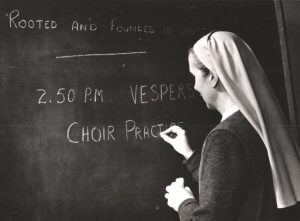 This Christmas as a medical student in Rosemount was going to be very special. Sister Aideen O’Sullivan, who was studying physiotherapy in UCD at the time, was testing our voices to see how best we could be suitable for the different singing parts of a Christmas Triptych of harmonious songs, readings, and solo portrayals of Gospel scenes.
This Christmas as a medical student in Rosemount was going to be very special. Sister Aideen O’Sullivan, who was studying physiotherapy in UCD at the time, was testing our voices to see how best we could be suitable for the different singing parts of a Christmas Triptych of harmonious songs, readings, and solo portrayals of Gospel scenes.
This was a welcome respite from the long hours of study, attending clinical reviews of patients in the hospital and sometimes assisting the Professor of Surgery, Patty Fitzgerald, with various surgical operations. Our medical classes continued in the afternoons in Earlsfort Terrace. We continued riding our bicycles there every day except if the weather was so inclement that we took the bus. Soon we would be getting our Christmas-New Year’s break.
The practices took place in the large parlour where there was a large fireplace burning coal to keep us warm. Sr. Maureen Mc Dermott was chosen to be the Blessed Mother and she looked beautiful with her long black hair under a long veil. She had a beautiful voice and looked the part very much. I can still hear her sing, “Behold, BEHOLD the handmaid of the Lord.”
The shepherds sang all three verses of Silent Night. I had never heard of descant voices before, but these came in at times higher than the soprano’s voice and sometimes gave a discordant note which gave a beautiful trill to what was being portrayed. I was given an Alto part and tried my best to keep the note and not wonder off to the soprano part.
With many repeated practices, Holy Innocents Day finally came, and Mother Mary visited us with all the American Sisters who were in Drogheda at the time. We always enjoyed having Mother Mary with us. She loved hearing this Triptych so much that Mother invited Sister Aideen to go to Drogheda and train the Sisters there to do the same production. Sr. Catherine Anne Dougherty was the Blessed Mother and did a very good job of singing her part. Sister Constancia Faul did not know she could sing so well until she tried and opened her mouth to produce a very sweet-sounding melody. She was perfect for her part. Mother Mary enjoyed the replay of this marvelous Christmas Triptych in Drogheda. Mother Mary always had her eyes and ears open to beauty and she wanted to share this joy with all the Sisters in Drogheda.
by Paul Campbell SJ USA 03.12.2023
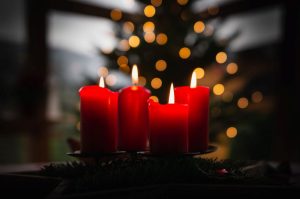 As you probably know, in both the “Old” (Hebrew) and “New” (Christian) Testaments, words ending with “el” suggest “of God.” Hence, Michael signifies “Who is like God?” Gabriel indicates that “God is my strength,” and, more generically, Angel suggests “Messenger of God.”
As you probably know, in both the “Old” (Hebrew) and “New” (Christian) Testaments, words ending with “el” suggest “of God.” Hence, Michael signifies “Who is like God?” Gabriel indicates that “God is my strength,” and, more generically, Angel suggests “Messenger of God.”
Emmanuel, of course, means “God with us.” Since my childhood, I have sung the Advent hymn, “O come, O come Emmanuel…” without realizing the truly extraordinary request I was making. I have been asking, and continue to ask, the Triune God to come and share our humanity with all of its messiness, madness and corruption. No big deal!
As a Jesuit, the Spiritual Exercises of St. Ignatius are at the heart of my worldview. At the beginning of the Second Week, we are given a “Contemplation on the Incarnation.” As with the other exercises of this week, we are asked to pray for an intimate knowledge of Jesus, to love him deeply and follow him more closely.
The “Contemplation on the Incarnation” suggests that we imagine the Trinity looking upon humanity and seeing what a terrible state we are in. Ignatius then invites us to hear the Trinity decide that ‘the Second Person shall become man to save the human race, and so, the fullness of times being come, they sent the Angel St. Gabriel to Our Lady.”
In this Advent Season, I invite you to join with me in contemplating the Incarnation. The Trinity continues to look upon us, seeing the tragedy unfolding in Israel and Palestine, the appalling condition of refugees and the dire poverty of too many millions of our sisters and brothers.
Yet, God is ever with us, bringing Christ to birth, so that we may be saved from ourselves.
by Sr. Jo Anne Kelly MMM Ireland/Nigeria 01.12.2023
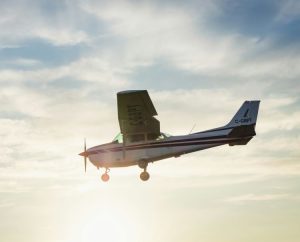 Many years ago. I was doing a brief spell of relief work for one of our Hospital Administrators. The sisters in the community all had different health-related professions. An older sister, Nora, herself a retired nurse, took care of the house and indeed, of all of us. One Saturday morning I came back from the office where I was trying to finish up the week’s work. Nora was at the door. I knew something had happened. She had climbed up onto a stool in the store, it slipped, and she fell. She had a pain in her back. I wanted to call Sr. Liz our doctor. She said “Let her rest, she was up half the night. We’ll have the tea first” and we did. When Liz saw her, she insisted she lie down until she had an X-ray. We settled her in her bed. The X-ray department was new and the only radiographer available for the call had gone to a wedding. It was long before we had mobile phones or any kind of phone.
Many years ago. I was doing a brief spell of relief work for one of our Hospital Administrators. The sisters in the community all had different health-related professions. An older sister, Nora, herself a retired nurse, took care of the house and indeed, of all of us. One Saturday morning I came back from the office where I was trying to finish up the week’s work. Nora was at the door. I knew something had happened. She had climbed up onto a stool in the store, it slipped, and she fell. She had a pain in her back. I wanted to call Sr. Liz our doctor. She said “Let her rest, she was up half the night. We’ll have the tea first” and we did. When Liz saw her, she insisted she lie down until she had an X-ray. We settled her in her bed. The X-ray department was new and the only radiographer available for the call had gone to a wedding. It was long before we had mobile phones or any kind of phone.
On Sunday morning the X ray showed a fracture of the spine and, thankfully, no displacement. But we could take no chances. Any wrong move and she could be paralyzed. Nora came back carried on a stretcher by four men. She was a tall heavily built woman and I feared she would slide off on our steep stairs. The men were very careful. With Nora safely in bed everything else started moving. There were no facilities anywhere near us to cope with that type of injury. She had to be flown home.
There were journeys to inform our MMM leader, the airline, the airport and Drogheda and all kinds of preparations to be made. The nearest airport was small, about two hours drive from us, but it did have one international flight each week direct to London. We had to get that – the next one was five days away. The airline officials were most cooperative and helpful. We did our best to care for Nora with very little facilities and she was a great patient. People in the village heard about the emergency and help came from everywhere. The Local Government graded our rough and stony road out to the tarmac. Our hospital tailor made three very wide canvas straps to ensure she would be secure on the stretcher down our stairs and up into the plane. We didn’t have an ambulance then, but a local Polytechnic lent us a long vehicle.
The day came for the journey. We knew there were many roadblocks on the way which would cause a lot of delay so one sister set off early to inform the police. Then followed the ambulance with Liz, who was accompanying Nora to Ireland. I followed with four men and all we would need at the airport, including a picnic supper. We sailed through the check points, the police graciously waving us on. In the airport, Liz set about making Nora ready for boarding while the rest of us had our tea. We got an early call to board. The men carrying, we proceeded up into the plane. Already a stretcher had been firmly secured over seats there. Space was very limited and transfer from one stretcher to another would have been very difficult. After many negotiations and ascertaining who took responsibility, we were allowed to secure our stretcher onto the one already there. We had brought the ropes hoping that would happen!!
I was aware Liz had not even had a drink, so I ran down and got her a mug of tea. As I started up the steps the plane door closed, and the official turned to come down. When he saw me he spoke into his ‘walkie-talkie’. The door opened and he came and took the mug of tea up and handed it in. The door slid closed again. The engines were already revving up. Two of us waited until the plane moved down the runway and prayed they would arrive safely. They did. About four days later Liz returned with the stretcher, but not the mug! About fifteen months later, Nora herself returned fully recovered.
Recently we celebrated the Feast of Christ the King. The Gospel was of Jesus telling people what they had done for Him when He was in need. They didn’t know they had done anything. I think of all the people who helped us at that time and all the millions of people helping others over the world today who don’t know that they are doing it for Jesus and so building up the Kingdom of God, the Kingdom of Love here on earth.
by Sr. Prisca Ovat MMM Nigeria 29.11.2023
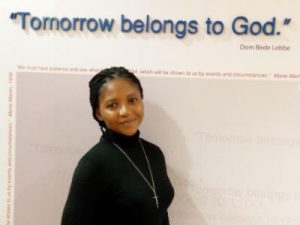 The approach of advent conjures in our consciousness the memories of Christ’s birth and all the events encasing this season. For whatever reason, waiting is uneasy. The experience can be uncomfortable. Either in anticipating interview/examination results or expecting laboratory test results, waiting comes with burdensome feelings. The apprehension accompanying these moments are emotions that we want to get over. Unlike every other waiting, however, at advent, we wait in gratitude for Christ, the Word made incarnate in the womb of the Virgin, without which our salvation would be incomplete. So, this waiting always leaves us with beautiful anticipated memories and imaginations. Indeed, Christ is worth all the wait.
The approach of advent conjures in our consciousness the memories of Christ’s birth and all the events encasing this season. For whatever reason, waiting is uneasy. The experience can be uncomfortable. Either in anticipating interview/examination results or expecting laboratory test results, waiting comes with burdensome feelings. The apprehension accompanying these moments are emotions that we want to get over. Unlike every other waiting, however, at advent, we wait in gratitude for Christ, the Word made incarnate in the womb of the Virgin, without which our salvation would be incomplete. So, this waiting always leaves us with beautiful anticipated memories and imaginations. Indeed, Christ is worth all the wait.
An African adage says, “What faces one person backs another.” This saying expresses a binary or dual view of life. For missionaries, this adage is experienced in high intensity as a new mission imposes a dual heart-faint experience. On the one hand, the emotive weight of an advent is energy-sapping. On the other hand, bidding farewells are often emotional. So, how should a missionary handle this twin reality?
Saying goodbye is undoubtedly nothing they ever would have conceived, let alone deal with at the moment of their advent. But are there any positives in saying goodbyes? Just as advent leaves one with touchy feelings, so too does come with melancholic moods. Scarcely has there been a farewell offered from a place of elating joy since the term itself connotes a painful exit, a parting manageable only by a few. As it is human nature, we say goodbyes or face leave-taking from our loved ones and colleagues with whom we had worked and shared memories and experiences.
A missionary is a person sent, and for as often as the invitation to move beckons, we rise and go. As a Medical Missionary of Mary, I have had to say several goodbyes for about 13 years, leaving behind a people who had become a family and from whom I had been greatly enriched. But does it feel right to be immune to saying goodbye? So, is there something good about saying goodbye, or must goodbyes always embody sadness?
This was the last question posed to my team. A chain of lamentation followed in response: Where does this leave us? Who will give us all the things we have enjoyed all these years? What will happen to the poor? Valid and genuine as these are, what happens to gratitude for the decades of good things enjoyed? Where is the trust in providence?
The openness to embracing the latter question births freedom and makes an advent experience meaningful. Conceivably, holding on to an old order leaves no room for growth, but the courage to let go frees us to look at life through different lenses, away from the comfort of the norm. Everyone would have to let go through goodbyes. Parents would have to let their children grow and find their path. Teachers would let go of their students as they progress from class to class. Correspondingly, missionaries would unreservedly bid adieu to people whose lives they had deeply shared to take up new responsibilities. Whatever the emotions, goodbyes are undeniably necessary. But when done with an open mind, saying goodbye becomes therapeutic in shaping our future. It opens us to the awareness of the advent stirring at us.
Thus, the best goodbye that helps manage a looming advent experience in a missionary’s life is self-abnegation, distancing oneself from inordinate attachments. With this, advent is embraced with open and free hearts such that, like the blessed Virgin Mary, our response to new missions shall always be: “Behold, I am the handmaid of the Lord.”
by Sr. Sheila Campbell MMM Ireland 27.11.2023
 Did you know that MMM collects used postage stamps? We have a small team of dedicated Sisters who trim and sort the stamps and they are sold to collectors. The money earned goes straight out to one of our needy missions in Kenya.
Did you know that MMM collects used postage stamps? We have a small team of dedicated Sisters who trim and sort the stamps and they are sold to collectors. The money earned goes straight out to one of our needy missions in Kenya.
Great Britain was the first country to issue adhesive postage stamps, the famous “Penny Black”. It was issued on May 6th, 1840. Before that time, the letters were taken to the Post Office and the fee for the transit paid over the counter in cash. The letters were then postmarked with a “paid” mark. In those days, letters were carried by a post-boy on horseback or in the mail coaches, which sometimes took several days over journeys from London to towns in the north.
In 1839, a competition was organised by the British Government, asking the public to send in ideas for the pre-payment of letters. Over 2500 entries were received, but none of them were satisfactory. It was then Sir Rowland Hill, with the help of a printer, produced the first postage stamps, the “Penny Black” and the “Two-Penny Blue”.
The “Penny Black” was changed to red in 1841, as it was found the postmark did not show well on the black stamp. At that time, perforating machines were not invented, and although the stamps were printed in sheets of 240, they had to be cut apart with scissors. The first perforated stamp did not appear until about twelve years later.
Other countries began to follow with stamps of their own. Brazil was the first to follow and its first issue appeared in 1843, and within ten years stamps were in use in nearly all the countries in the world.
What is the value of a “Penny Black” today? In 2008, a Penny Black in poor condition can cost as little as £15. A reasonable looking Penny Black will cost you £25. A better-quality specimen might cost £60 to £100. A stamp with unusual attributes can cost up to £250. Mint examples are considerably more valuable – expect to pay anything from £1800 upwards.
So, the moral of the story is – don’t throw your stamps away, send them to us in Drogheda!
by Sr. Genevieve van Waesberghe MMM Tanzania/ Ireland 25.11.2023
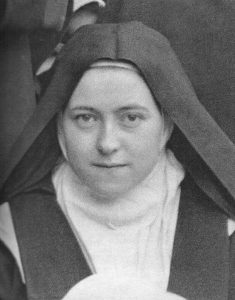 Did you know that during the first World War, less than 20 years after her death, Thérèse had already conquered the heart of many soldiers battling in the trenches in France and Belgium? They had her picture and prayed to her. She appeared to some forty known soldiers. Many spoke of their miraculous protection. This was at the time when Marie Helena Martin (Mother Mary) was a VAD Nurse in Malta and France.
Did you know that during the first World War, less than 20 years after her death, Thérèse had already conquered the heart of many soldiers battling in the trenches in France and Belgium? They had her picture and prayed to her. She appeared to some forty known soldiers. Many spoke of their miraculous protection. This was at the time when Marie Helena Martin (Mother Mary) was a VAD Nurse in Malta and France.
In 1997, Thérèse became a Doctor of the Church. Interestingly, out of thirty-seven Doctors of the Church, only four are women! Her science is “Love that has no borders.” She teaches us to love, in the ordinariness of life, accepting our own fragility and trusting God’s love for everyone, more especially the sinners, the poorest, and those on the periphery. I like to think of the conversion of the murderer, Pranzini, before his beheading in 1897 and of the singer Edith Piaf’s spiritual friendship with Thérese. Edith was cured of blindness when she was six and living in misery.
Therese was a missionary at heart. She never left her monastery but wrote to many missionaries, prayed for them. Mother Mary was a special friend of her and entrusted our MMM healing mission to her. Personally, Thérèse has been my ‘travel manager’. My ministry included travelling in Africa through many insecure areas, and Thérèse never let me down!
For many years, Therese’s relics have travelled the world over including to Russia (1999), to Ireland -Drogheda (2001) , and to Jerusalem (2011).
This year is a year of graces. We celebrate the 150th birthday of Thérèse (2nd Jan 1873) and the 100th anniversary of her beatification (29th April 1923). In France, during 2022-23, even UNESCO is paying tribute to Thérèse, recognizing her spiritual, cultural, and educational contribution to humanity. A special event will be held in Paris on 27th November 2023.
Recently, while in France, I prayed in front of the relics of St Thérèse. I had been deeply affected by the current news of hate, violence, and wars. I prayed for justice and peace, for all victims of wars, children, hostages, relief personnel, human rights defenders, and leaders.
I felt encouraged and close to Therese and wondered what would happen if all of us prayed for Peace through her intercession during this Jubilee year?
Thérèse show to us the way of Peace!
by Nadia Ramoutar MMM Communications Coordinator Ireland 23.11.2023
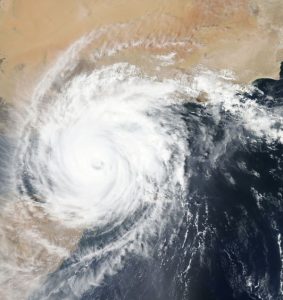 There is a major storm in Ireland today on a Monday morning and the schools are opening late. We are fortunate that with all the technology we have we can know in advance that a storm is coming and we can make plans accordingly. The electricity is out in much of the country but there are professionals working hard to get it restored quickly. We are the lucky ones.
There is a major storm in Ireland today on a Monday morning and the schools are opening late. We are fortunate that with all the technology we have we can know in advance that a storm is coming and we can make plans accordingly. The electricity is out in much of the country but there are professionals working hard to get it restored quickly. We are the lucky ones.
This frequency of bad storms now is becoming common all over the world, just in some places they are not equipped to deal with them and have few if any resources. Without a doubt the amount of environmental impact on weather is causing massive fires, droughts, floods, and storms. The weather is becoming more exaggerated and places are experience more catastrophic weather.
When we were visiting Tanzania, people were explaining how the erratic weather is making it even harder for people to grow food. This seems like such a cruel turn of events. The very people who need to be able to grow food are unable to do so because of climate crisis weather changes. Also, we know that the people in this area had the least to do with creating the climate change we are experiencing.
Is this the true nature of injustice? The people who are suffering are not the ones who caused the crisis to occur, yet they are experiencing is the most harshly. This without a doubt seems to be hard to fathom.
When we look at the lessons in the bible we see that wonderful story of the visitation which is the inspiration for the MMMs ethos. When someone is in need, we will rush to their side no questions asked and will be there for them. We know that when Mary rushed to her Cousin’s side it was with a pure heart and open arms to help.
When we think of our brothers and sisters around the world suffering with the side effects of climate crisis, can we not perhaps increase our efforts to change our habits to protect them more? Can we in the west not be a bit more aware that our convenient behaviours and ways of creating waste are causing a crisis for others.
Can we find a way to be inspired to bring real change and to bring our open minds and arms to greater efforts? If we don’t get going on this in a serious way very soon, our window of opportunity for the Earth will pass us. There is no drama or theatrics in saying this. We have known for some time that major change is essential but as a species we don’t seem to be heeding the warning.
It is our time to show up for our global families in their hours of need by being less selfish each day and finding ways to collectively be better stewards of our own planet – and our only planet.
by Sr. Sheila Campbell MMM Ireland 21.11.2023
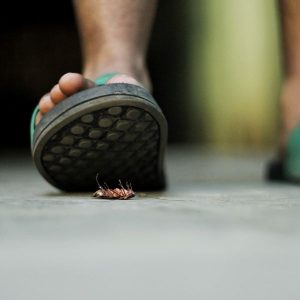 It often happens that the first step in exercising solidarity is exploring the lack of self-esteem among people who are marginalized. In one women’s group in Brazil the participants were asked to draw something that expresses “who am I?” Elizabeth complained that she couldn’t draw. “You don’t have to be an artist”, it was explained, “just any rough picture that helps you say who you are, or how is your life just now.” She drew a cockroach.
It often happens that the first step in exercising solidarity is exploring the lack of self-esteem among people who are marginalized. In one women’s group in Brazil the participants were asked to draw something that expresses “who am I?” Elizabeth complained that she couldn’t draw. “You don’t have to be an artist”, it was explained, “just any rough picture that helps you say who you are, or how is your life just now.” She drew a cockroach.
The discussion began. Why did she choose that? Her reply came softly at first until she was secure enough to express the real anger she was feeling. “What do you do when you see a cockroach?”, she asked. “You step on it and try to kill it. This is what has been happening to me all my life.”
Starting from this low point, it takes a lot of patience to help women to accept their true worth, to realise their potential and begin to explore their talents. This was the reality of my work with women in prostitution in the city of Salvador. Many were trapped in prostitution by illiteracy and poverty and traumatized by violence since childhood.
The health of these women was my special concern. As well as the sexually transmitted diseases you would expect, most also suffer from stress-related illnesses – hypertension, gastritis, cardiac problems. Many suffered from the violent behaviour of their clients or home partners but they were reluctant to go to the police to complain, as their complaints were not treated seriously.
Once we set up a literacy class for the women. This gives women a better chance of integrating with the wider society. Lucia was one woman who taught me this. She was 46 years old and came to Salvador as a teenager from another State. She worked all day in brothel near the port. Lucia told me how excited she was when she managed to join up her letters and how much she enjoyed the literacy class. The previous year, she bought a long-distance bus ticket to go to visit her mother, but missed the bus because she could not read the name of the destination written up on the front. “I will never miss my bus again,” she said happily.
by Sr. Jo Anne Kelly MMM Ireland 19.11.2023
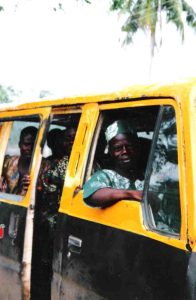 I read a reflection about the Gospel reading of last Sunday- the parable of the wise and foolish virgins. The writer told about organizing and leading pilgrimages for more or less the same group of people over many years. Every single year the same three or four people were never ready when the coach was due to leave or return.
I read a reflection about the Gospel reading of last Sunday- the parable of the wise and foolish virgins. The writer told about organizing and leading pilgrimages for more or less the same group of people over many years. Every single year the same three or four people were never ready when the coach was due to leave or return.
It reminded me of a time I was working with a group of young women. Three mornings a week they attended classes, with other young women and men in an Institute on the other side of the city from where we lived. It was a very big crowded city. These were treasured classes and nobody wanted to miss them. I was doing the driving. The time to leave was 8.30am to be sure we’d get across in time. Every single morning one girl would come running minutes late, the same girl every day. When we got home one day. I told them from now on I would leave on time with whoever was already in the car. The next day I did so and the same girl got left behind.
She went back to her room collected her pocket money, which was very little at the time, and walked out to the busy road where mini buses were passing. She was not very familiar with the city but she found a bus going to the city centre. There she stepped down into a crowded market area, with traders’ stalls both sides of the road, young men pushing wheelbarrows selling their wares, crowds of people jostling each other, lots of noise and loud music, and rows of buses filling up ready to go off in all directions, their drivers shouting out their destinations, almost impossible to be heard over all the din. . She eventually found a bus going in the direction she wanted and had quite a walk from the main road in to the Institute. She arrived as the last class of the morning was beginning. She told us all this on the way home. I admired her effort and we had lots of fun about it. She also learnt it is good to be alert and ready when there’s something good being offered.
For us there is always something good being offered. Pope Francis once said. “God conceals Himself in the most common and ordinary situations in life and we need to be constantly aware of this reality. There is a danger of not recognizing His coming. He quotes St. Augustine ‘I fear He will pass and I will not recognize him.’ But the l Lord is coming, marking the foundation of our Hope” Perhaps Hope is the one thing we all need in our world today. By our tardiness, or failing to be awake and alert we can miss the gift.
by Nadia Ramoutar MMM Communications Coordinator Ireland 17.11.2023
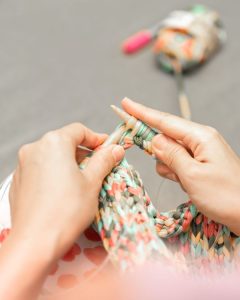 One of the joys of my work in the Communications Department for the MMMs, is that I am always overwhelmed listening to the MMM Sisters stories of what they have done and what they have seen over the years. Even our young MMM Sisters have incredible experience in healing people and empowering people in desperate situations. They work in some of the poorest and most neglected places in the world. After a life of service, many of our MMM Sisters return to our Motherhouse in Drogheda, but their hearts and minds are still very much on the mission. They never really leave.
One of the joys of my work in the Communications Department for the MMMs, is that I am always overwhelmed listening to the MMM Sisters stories of what they have done and what they have seen over the years. Even our young MMM Sisters have incredible experience in healing people and empowering people in desperate situations. They work in some of the poorest and most neglected places in the world. After a life of service, many of our MMM Sisters return to our Motherhouse in Drogheda, but their hearts and minds are still very much on the mission. They never really leave.
Last year we held a Christmas Craft Fair in Drogheda in our auditorium and invited the community for the first time in 15 years. The Day was a massive success with us raising over €6,500 for a maternal health and baby clinic near a slum in Malawi. There was a buzzing of joy all day long as people gathered and purchased handmade crafts and artisan items. It was a lot of work but it was also exciting to put the “fun” back in Fundraiser. Our MMM Sisters of all ages were vibrant and overflowing with energy and Christmas cheer.
What was even more wonderful for me was to see the MMM Sisters in the weeks leading up the Craft Fair busy knitting, crocheting, making cards, ornaments and Christmas items for the Craft Fair. We are doing the same thing this year and we will have two craft making sessions to get things ready for the big day. Many of our MMM Sisters have been crocheting and knitting all year long to create exquisite handmade items for the Craft Fair.
It is so great to see all the tireless effort and hope being sewn into every item.
We are blessed to have so many caring women who will do anything at all they can to still raise money and awareness for the Sisters still at work in the field. It is such a circle of love and giving that lift my heart and helps remind me of the light and goodness still in the world. As we watch the TV news or look on social media there is so much destruction and it weighs on the heart. Seeing the Sisters busy making beautiful items creates a true feeling of Christmas.
If it is possible for you to join us, our Craft Fair will be 25th November 2023 at the Auditorium in Drogheda. We would love to see you there. If you can’t make it, keep us and the Sisters in your prayers as we make Christmas magic for the whole community to share with the world and people in most need.
